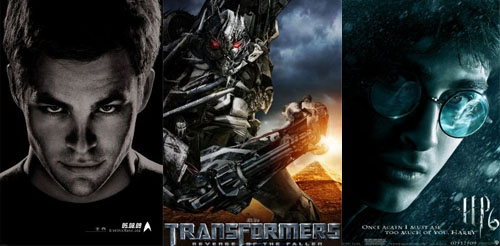Forgiving the Film: Summer Adaptations, Reboots and Sequels

[Warning: Portions of this article may constitute spoiler material if you haven't read the Harry Potter books.]
Have you ever given a film or a filmmaker credit, even for the failings of a film?
It's been an interesting summer. Early this year, some of us very lucky Austinites caught the unofficial world premiere of Star Trek, resulting in quite a bit of flak from the media. Paramount was accused of stacking the deck with Trekkies (not true), and it wasn't until the press outside of Austin had an opportunity to see Star Trek for themselves that suddenly, they were agreeing with us.
The interesting thing is that for all the glowing reviews, Star Trek is a flawed film. But its flaws were easily marginalized because the director and writers clearly understood the Star Trek universe, the characters and how to tell a good story. We could discuss some of the logic breaks, or the lack of character development outside of Kirk and Spock, but what really matters is that was fun, thrilling and made us want more. I say "we" because I know I'm not alone. At least on Slackerwood.
Then came Transformers: Rise of the Fallen. Michael Bay is a god to some and the devil incarnate to others. Personally, I find his films to be a disappointment; I've seen The Rock and Armageddon. I know he can make a solid action film, if not high cinematic art. With Transformers: Rise of the Fallen, the worst faults of Hollywood were evident: racist innuendo, misogyny, schizoid plot, asinine dialogue, all wrapped up in a dizzying explosive display. It's a film that makes me want to turn into my late grandmother, and do her pursed lips, furrowed brow and pointed finger, shaming Bay for being such a disappointment when I know he can do so much better.
The irony isn't lost on me that the writers for Transformers: Rise of the Fallen also penned Star Trek. Interestingly enough, Roberto Orci and Alex Kurtzman, who attended the Austin premiere of Star Trek, joked that if the Austin audience didn't like it, they wouldn't survive. They didn't come to Austin for the Transformers sequel, and addressed the racism claims in an article on Film School Rejects.
But that leads me to Harry Potter and the Half-Blood Prince. I wanted to love it, but I find myself struggling to find justification to do so. And I've put quite a lot of thought into it. In a CNN article, director David Yates talks about the decisions to leave out a lot of explanation from the book. I understand the decision, and that's one of the reasons I'm giving HP6 more credit than I might, say, a Bay film. If you've read any of the books, you're aware that they're sequentially longer, and you're probably aware that book seven is being adapted as two different movies.
I understand the decisions they made, which are justified. I appreciate the pressure they were under and the rationale behind their choices. I know some of the scenes, especially the awkward final scene, were necessary. All that doesn't make it work well as as a stand-alone film.
Watching Harry Potter and the Half-Blood Prince, which runs 153 minutes, it still feels like the cinematic equivalent of an over-pruned bonsai. I understand the need to pare down the secondary and tertiary plots, but not at the cost of unbalancing the work. But it has the same problem Watchmen did: too much story compressed into too little time. It's pretty, it has scary moments, and anyone who knows the books knows there's a helluva climax. But it doesn't leave the same satisfying feeling as Harry Potter and the Prisoner of Azkaban or even Harry Potter and the Goblet of Fire. Still, even after all that, you can't fault the acting, or even the scenes that appear; it's more what's not on the screen.
As someone who read the books, I paid particular attention to three characters whose every move through the story will be scrutinized after the fact, just like they were in the book, leading up to the shocking climax. If for no other reason, that climactic scene is worth a thumbs-up by itself, along with a silent denouement that is a fitting lead-in to the final two films, despite the final scene.
Ultimately, this entry in the series has the disadvantage of being an installment that sets up the final two films -- necessary, but nearly mechanical.
I think what it comes down to is that in the case of both Harry Potter and the Half-Blood Prince and Star Trek, there's a great deal of heart, so even when the films fail on an intellectual level, it's harder to dismiss them on an emotional one.

